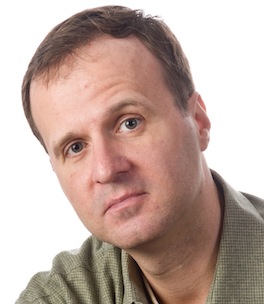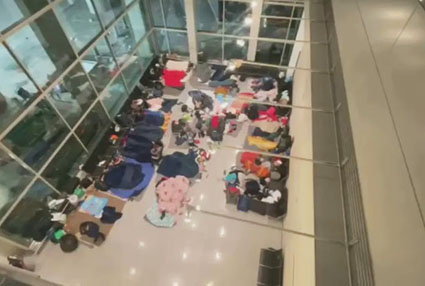Special to WorldTribune.com, February 19, 2024

Corporate WATCH
Commentary by Joe Schaeffer @Schaeff55
The latest attempt to normalize innately unnatural behavior comes out of woke Boston. Progressive residents are responding to a local government and big-box media call to shelter migrants in their homes. The apparent idea is that you’ll see this and want to join in, too.
“The family is lovely. They are so appreciative. It has been wonderful,” Brookline, Massachusetts, resident Jessica Stokes told WBZ, the CBS television affiliate for Boston in a glowing Feb. 9 report.
“When Colin and Jessica Stokes called the state to sign up to be a host family, it took less than an hour for the displaced migrants to be dropped off at their door,” WBZ noted. “The family of four, who didn’t want to go on camera, had been sleeping at Logan Airport. The parents and two kids journeyed from Chile to Texas then Massachusetts. And there are so many stories like it.”
“I was like, I have to get sheets on the beds. How many people are coming? Where are they from? What ages. We really knew nothing,” Jessica breathlessly exclaims. “The need is so clearly overwhelming,” Colin adds.

Make a phone call to a government office, and take four foreign aliens you know nothing about into your home less than one hour later? Who does that?
Boston has been a staunchly progressive city for some time. In recent years, that inclination has taken a decidedly radical bent. Brookline, the section of Boston where the Stokes live, is a traditionally wealthy enclave ideal for serving as the seat of fashionable, financially comfortable leftism in the city.
Brookline’s demographics for 2023, according to the US Census Bureau, reveal it to be 68.6% white, 18.4% Asian, 6.6% Hispanic and only 2.7% black. Median housing price: $1,181,200.
The Stokes are not an anomaly in Brookline. Boston’s NBC television affiliate trekked out to the moneyed neighborhood for a Feb. 12 feature piece on Haitian migrants welcomed into yet another progressive resident’s apartment home.
“It’s a delight, and it’s really fun having them. What I realized is there’s so much prejudice against refugees mostly because people don’t know them,” Lisa Hillenbrand told the station of her reasons for serving as a personal sanctuary for foreign aliens.
“Hillenbrand is impressed by the number of people she’s met at the Brookline Town Hall meetings who’ve been stepping up and hosting families. She’s hopeful in the coming days and weeks that more will do the same,” NBC10 coos.
It’s no coincidence that the local affiliates of two of the four major television networks in the US ran two highly similar puff pieces on this profoundly bizarre behavior within a three-day period. A concerted ruling progressive establishment effort to normalize the “migrant” inundation of America’s town and cities is reaching a boiling point.
Last July, Boston NPR affiliate WBUR’s blatant platforming of government urging for Massachusetts residents to house migrants. They’re government-funded and acting as an echo chamber of government central planning, but don’t you dare call NPR state-affiliated, Mr. Musk.
“The new host family strategy comes as the state scrambles to expand shelter capacity and provide for an increasing number of homeless families,” WBUR stressed. “The state’s new Family Welcome Center in Allston is tasked with recruiting, vetting and onboarding host families, as well as pairing them with the families in need.”
The outlandish campaign was rolled out as migrants were being dispatched to small towns throughout the Bay State.
Two things spring to mind. First, why can’t these well-off progressive urbanites welcome struggling Americans into their homes? “They are hardworking, they want to learn, they want to be successful, and I feel great helping and I get to understand the refugee crisis from the inside,” Lisa Hillenbrand said of her Haitian guests.
Are there not any local citizens struggling mightily to get by who also “want to learn, want to be successful” and could desperately use a helping hand at a time when rents are skyrocketing?
“[T]here are thousands of children in Massachusetts waiting for permanent homes. The Massachusetts Adoption Resource Exchange (MARE) reported a 30% decrease in adoptions during 2020 and 2021,” Hoodline’s Boston news portal reported Nov. 18 on National Adoption Day.
What about them?
Secondly, the ever-increasing Orwellian role of the dominant media is on display once again. The same playbook can be seen at work in another ongoing ruling progressive establishment operation, the campaign to normalize euthanasia. Emotion-laden personal accounts of Americans killing themselves via medical assistance were splashed across the pages of The New York Times and Boston Globe on Dec. 28 and Jan. 26, respectively.
The Times’ account detailed the final exit of a lesbian who duly noted her white privilege in being able to purchase the death pills oppressed “people of color” can’t afford:
With the MAID request approved, Maddy, Julie’s spouse of 35 years, picked up the prescription from a local pharmacy. The price: $900, which is not covered by Medicare, the Department of Veterans Affairs or many private insurance plans.
A study published in The Journal of the American Geriatrics Society last year found that 96 percent of people who died by medical aid in dying were white and 72 percent had at least some college education. “The reality is that communities of color, for a wide variety of reasons, also are more likely to utilize aggressive care and less likely to use other end-of-life care options, such as hospice and palliative care,” explained [pro-euthanasia organization Compassion and Choices CEO Kim] Callinan. People without the resources to pursue MAID may be forced to make a different choice: suffer through a painful death or take matters into their own hands. “Be sure to include these statistics when you write about this,” my sister directed me.
The Globe’s report featured a Unitarian social activist who equated the right to euthanasia as fully akin to a woman’s right to abortion:
[Lynda’s] most urgent wish, the one she had argued and fought for, was to decide for herself when and how she died.
She believed it is a right anyone with a terminal illness should have, akin in importance to a woman’s right to choose whether to end a pregnancy….
Lynda Shannon Bluestein and her husband supported the concept of medical aid in dying long before cancer struck her. They attended a Unitarian church, and, unlike many religions that oppose the concept, the Unitarians were a driving force to pass a bill in Oregon, the first state to legalize medical aid in dying in 1997.
Indeed, Lynda had been advocating for causes that bucked convention most of her life….
The mass shooting in Lewiston, Maine, shook her. As her days dwindled, the drumbeat of shootings, the overturning of Roe v. Wade, the state of the nation in general, weighed on her.
“I now look back on so much of my advocacy as a lot of sound and fury that changed nothing,” she said in November.
For all her frustration, she was determined to follow through on her final cause, her most intensely personal advocacy.
This same ideological orientation is also fueling the preening benevolence of well-off Bostonians in tony Brookline. It’s a disturbing modern leftist twist on Charles Dickens’ devastating critique of “telescopic philanthropy” in the Britain of 180 years ago.
From a 2016 essay by Jacqueline Pfeffer Merrill in Philanthropy Daily:
Bleak House is justly regarded as Dickens’ richest, most complex novel…. Dickens contrasts Mr. Jarndyce with Mrs. Pardiggle and Mrs. Jellyby whose philanthropy is directed at the Tockahoopo Indians and tribes of Borrioboola-Gha in Africa. Dickens styles these ladies’ work as ‘telescopic philanthropy’ because the objects of their philanthropy are so remote.
Dickens’ sharp critique of telescopic philanthropy was highly germane when he was writing Bleak House, when about one-seventh of philanthropic funds collected by London charitable organizations were directed to overseas philanthropies. Dickens judged that these organizations were blameworthy for neglecting the English poor and attempting to do good in far-away places that they little understood.
Communications, travel and other interconnectivity advances in 2024 society have brought the “little understood” far-away places right to our doorsteps. Yet, just as in Dickens’ time, well-off supposed do-gooders are gazing right past the acute problems faced by their fellow-citizen neighbors as they center their focus on the fashionable plight of the exotic other.
Action . . . . Intelligence . . . . Publish
